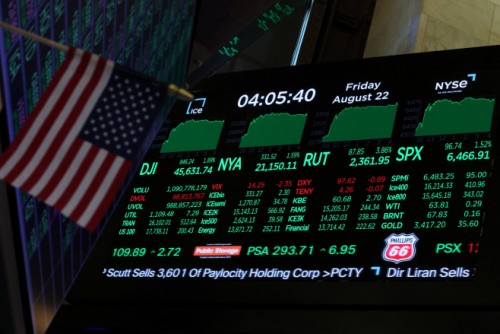 |
| A monitor shows rising major U.S. stock indexes at the New York Stock Exchange on August 22. / Reuters-Yonhap |
The S&P 500 index, the benchmark for large-cap U.S. equities, has grown more expensive than during the 1999–2000 dot-com bubble, the Wall Street Journal reported on September 1.
According to the report, investors are now paying a record premium for each dollar of sales. On August 28, the S&P 500’s price-to-sales ratio (PSR) hit 3.23 times, surpassing the bubble-era peak of 2.87. The index is also trading at 22.5 times expected earnings over the next 12 months, well above the 2000–2024 average of 16.8.
While the price-to-earnings ratio has not reached bubble levels—thanks to surging profits at major firms—the data underscores how much market strength relies on a few dominant technology names.
Morningstar data shows the top 10 companies now account for 39.5% of the S&P 500’s market value, the highest concentration on record. Nine of these companies are each worth more than $1 trillion, driven by the so-called Magnificent 7—Amazon, Alphabet, Apple, Meta Platforms, Microsoft, Nvidia, and Tesla.
Analysts warn such concentration makes the index vulnerable to external shocks. When President Donald Trump announced reciprocal tariffs against 57 trade partners in April, M7 stocks fell more sharply than the broader index.
Steve Sosnick, chief strategist at Interactive Brokers, cautioned that “the combination of very high valuations and very crowded trades heightens the market’s vulnerability to a prolonged downturn,” adding, “if everyone owns the same stocks, who will step in to buy when prices fall?”
By comparison, the average S&P 500 company trades at 1.76 times sales—slightly above the long-term average of 1.43. Mark Giambro, U.S. equities chief at Barrow Hanley Global Investors, argued this creates attractive opportunities outside the tech titans. He expressed skepticism about whether today’s giants can sustain their lofty valuations, preferring component makers that could benefit from productivity gains driven by artificial intelligence without being priced at extremes.
Most Read
-
1
-
2
-
3
-
4
-
5
-
6
-
7





















